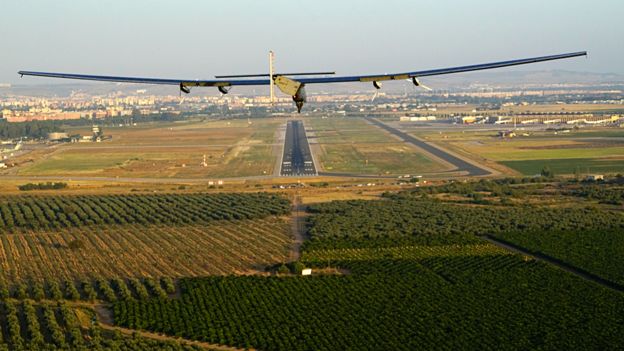Solar Impulse completes Atlantic crossing with landing in Seville
 Jonathan Amos / June 24: The zero-fuel aeroplane, Solar Impulse, has touched down in Spain, completing the 70-hour Atlantic leg of its historic bid to circle the globe.
Jonathan Amos / June 24: The zero-fuel aeroplane, Solar Impulse, has touched down in Spain, completing the 70-hour Atlantic leg of its historic bid to circle the globe.
The landing in Seville marked the end of the 15th stage of Solar Impulse’s journey. Pilot Bertrand Piccard made swift progress over the ocean after leaving New York on Monday.
Mission managers will now plot a route to Abu Dhabi where the venture began in March, 2015. The project had hoped to end the 6,000km Atlantic leg in Paris, to echo the pioneering flight in 1927 of Charles Lindbergh.
Lindbergh’s Spirit of St Louis aircraft was the first to make the solo crossing. As it turned out, the forecast this week in Paris was for storms, and so Seville was chosen as the safest option.
Mr Piccard spoke to a crowd of well-wishers at Seville’s airport after stepping out of Solar Impulse’s cockpit.
“The Atlantic has always been this symbol of going from the Old World to the New,” he told them. “Everybody has tried to cross the Atlantic, with sailboats, steamboats, airships, aeroplanes, even rowing boats and kitesurfs. Today, it’s a solar-powered aeroplane for the first time ever, flying electric with no fuel and no pollution.”
Solar Impulse has moved rapidly around the Earth since renewing its challenge in Hawaii on 21 April.
In 2015, the plane flew eight stages from Abu Dhabi to Kalaeloa, including a remarkable four-day, 21-hour leg over the western Pacific – the longest solo flight in aviation history in terms of the time it took.
But it was damage to its batteries on that stage that forced Solar Impulse to then lay up for 10 months, for repairs and to wait for optimum daylight length in the northern hemisphere to return.
Solar Impulse is covered in 17,000 photovoltaic cells.
These either power the vehicle’s electric motors directly, or charge its lithium-ion batteries, which sustain the aircraft during the night hours.
The project is not really intended to be a template for the future of aviation, but rather a demonstration of the capabilities of solar power in general.
Mr Piccard shares the flying duties with his business partner, Andre Borschberg. The former Swiss air force pilot will take charge for the next leg, across the Mediterranean (it will likely take two stages to get to Abu Dhabi).
Setting off from Seville will be easier than from Paris in this respect, said project team-member Yves Andre Fasel who liaises with air traffic control.
“If we would have arrived in Paris like we wished, it would have been very complicated because we would have had to cross a lot of air traffic controls.
“From Seville, if we go along North Africa, I don’t think there will be a lot of difficulties – from traffic. The difficulties will be more to do with military reasons and things like that.” bbc.com
